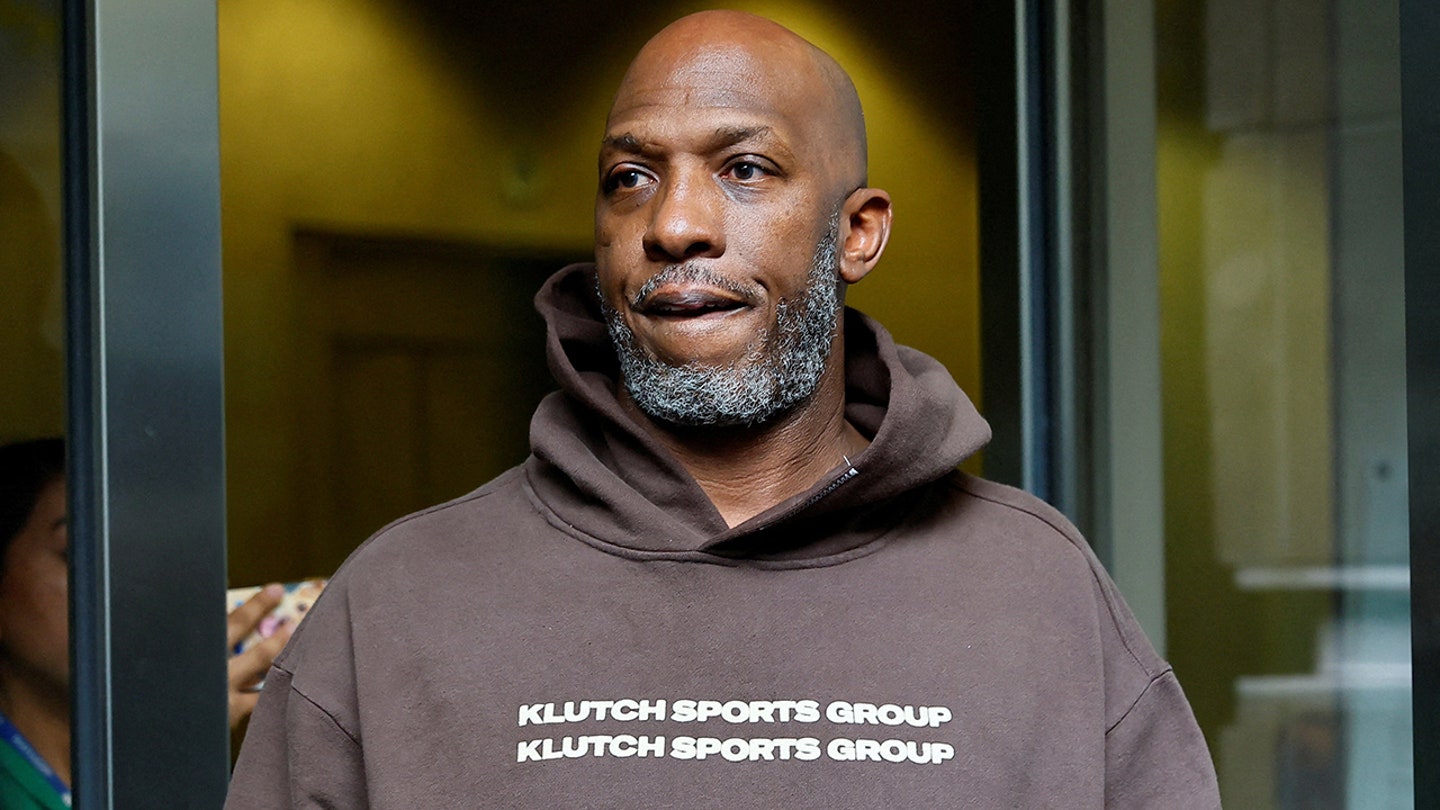
FBI says Mexican authorities seize $40M in motorcycles from Olympic snowboarder turned fugitive
Entities mentioned:
- Ryan Wedding: Greed, Power, Self-preservation
- FBI: Justice, Duty, Determination
- Mexican authorities: Justice, Cooperation, Security
- Kash Patel: Justice, Determination, Professional pride
Article Assessment:
Credibility Score: 75/100
Bias Rating: 55/100 (Center)
Sentiment Score: 35/100
Authoritarianism Risk: 25/100 (Generally Democratic)
Bias Analysis:
The article presents facts from official sources and includes quotes from law enforcement. While it focuses on the criminal allegations, it also mentions Wedding's Olympic background, providing some balance.
Key metric: Drug-related Crime Rate
Let me tell you something - this story is RIDICULOUS! We've got a former Olympian who's gone from the slopes to the criminal underworld, folks! Ryan Wedding has pulled off a MAJOR LEAGUE pivot from snowboarding to becoming the MVP of a transnational drug empire. But the FBI is not about to let this guy slide! They're bringing their A-game, folks, with a $15 million bounty that's like putting a championship ring on the line. The seizure of those motorcycles? That's a HUGE defensive play by Team Law Enforcement, stripping Wedding of his assets like a linebacker sacking a quarterback. This is a high-stakes game of cat and mouse, and I'm telling you right now, the feds are in full-court press mode. Wedding might think he's winning, but with the FBI and international authorities teaming up, it's looking like the fourth quarter is about to get real tough for this fugitive snowboarder turned drug lord!

Looking back at the sports gambling controversies throughout 2025, with NBA and MLB investigations leading way
Entities mentioned:
- FBI: Justice, Control, Duty
- NBA: Professional pride, Control, Legacy
- MLB: Integrity, Control, Professional pride
- Terry Rozier: Greed, Self-preservation, Fear
- Chauncey Billups: Greed, Power, Recognition
- Damon Jones: Greed, Influence, Self-preservation
- Emmanuel Clase: Greed, Fear, Self-preservation
- Luis Ortiz: Greed, Fear, Self-preservation
Article Assessment:
Credibility Score: 75/100
Bias Rating: 55/100 (Center)
Sentiment Score: 25/100
Authoritarianism Risk: 30/100 (Generally Democratic)
Bias Analysis:
The article presents a fairly balanced view of the gambling controversies, citing multiple leagues and incidents. It relies on official sources and indictments, maintaining a neutral tone despite the sensational nature of the stories.
Key metric: Sports Integrity Index
Let me tell you something - this story is RIDICULOUS! We're seeing a full-court press by the FBI against corruption in sports, folks! The league commissioners are in a defensive stance, trying to protect the integrity of the game. But these players and coaches? They've fumbled the ball big time! We're talking about a major league scandal here - from the NBA to the MLB, we've got star players and coaches allegedly throwing games like they're tossing batting practice! This is a championship-level crisis for sports integrity. The FBI is blitzing these gambling rings, but it's clear we're only in the first quarter of this fight. The leagues need to step up to the plate and hit a home run with stricter policies, or we'll be seeing more players and coaches benched - permanently.

NBA star pleads not guilty to federal gambling conspiracy charges in court
Entities mentioned:
- Terry Rozier: Greed, Self-preservation, Fear
- NBA: Professional pride, Control, Justice
- Jim Trusty: Duty, Determination, Loyalty
- Deniro Laster: Greed, Competitive spirit, Influence
- FBI: Justice, Duty, Control
Article Assessment:
Credibility Score: 75/100
Bias Rating: 50/100 (Center)
Sentiment Score: 30/100
Authoritarianism Risk: 25/100 (Generally Democratic)
Bias Analysis:
The article presents a balanced view of the situation, quoting both the prosecution's allegations and the defense's statements. It refrains from making judgments and sticks to reporting the facts of the case and court proceedings.
Key metric: Professional Sports Integrity Index
Let me tell you something - this is a GAME-CHANGING play in the world of professional sports! Terry Rozier, once a star player, has found himself in the penalty box of federal court. This isn't just a personal foul, folks, it's a potential CAREER-ENDING violation! The NBA, acting as the ultimate referee, has benched Rozier faster than a coach calling a timeout in the final seconds. We're seeing a full-court press by the FBI, determined to shut down this illegal gambling fastbreak. Rozier's defense team is playing zone, trying to block these charges, but they're facing a tough offensive strategy from the prosecution. This could be a buzzer-beater moment for the integrity of professional sports. I'm telling you right now, if this conspiracy goes deeper, we might see more players fouling out of the league faster than you can say 'technical foul'!

Canadian lawyer advised ex-Olympian, alleged drug lord to kill witness to have case dismissed, DOJ says
Entities mentioned:
- Deepak Paradkar: Greed, Power, Self-preservation
- Ryan Wedding: Power, Revenge, Self-preservation
- FBI: Justice, Duty, Professional pride
- DOJ: Justice, Duty, Professional pride
Article Assessment:
Credibility Score: 75/100
Bias Rating: 45/100 (Center)
Sentiment Score: 35/100
Authoritarianism Risk: 25/100 (Generally Democratic)
Bias Analysis:
The article presents facts from official sources with minimal editorializing. It balances details about the accused with information about law enforcement actions, maintaining a relatively neutral stance.
Key metric: Crime Rate
Ladies and gentlemen, we're witnessing a GAME-CHANGING play in the world of criminal justice! The FBI and DOJ have just executed a MASSIVE DEFENSIVE MOVE against a team of heavy hitters in the drug trafficking league. Let me tell you something - this is the kind of fourth-quarter strategy that separates the champions from the also-rans! Deepak Paradkar, once a trusted coach, has been caught running interference for his star player, Ryan Wedding. But folks, this is no ordinary foul - we're talking about advising MURDER to win the game! It's like telling your quarterback to take out the opposing team's star receiver! This is RIDICULOUS! The justice system is stepping up to the plate, showing a championship mentality by throwing everything they've got at this criminal enterprise. With a $15 million bounty on Wedding's head, it's clear the feds are playing to win. I'm telling you right now, this is the kind of all-or-nothing play that could change the entire landscape of the drug trafficking league!

Fugitive Olympic snowboarder faces new accusations as feds raise reward for his capture to $15M
Entities mentioned:
- Ryan Wedding: Power, Greed, Self-preservation
- FBI: Justice, Duty, Determination
- Kash Patel: Duty, Justice, Competitive spirit
- Pam Bondi: Justice, Duty, Righteousness
Article Assessment:
Credibility Score: 75/100
Bias Rating: 55/100 (Center)
Sentiment Score: 30/100
Authoritarianism Risk: 35/100 (Generally Democratic)
Bias Analysis:
The article presents a balanced view of the case, quoting multiple officials and providing background information. While it focuses on law enforcement's perspective, it doesn't overtly editorialize.
Key metric: Drug Trafficking and Crime Rate
Let me tell you something - this is a CHAMPIONSHIP-LEVEL SHOWDOWN between law enforcement and a rogue Olympian turned drug lord! Ryan Wedding has gone from carving up the slopes to carving up a criminal empire, but the FBI is bringing their A-game to take him down. This is a high-stakes matchup, folks! Wedding thought he could outmaneuver the justice system, but he's about to face a full-court press from the feds. The FBI is pulling out all the stops, raising the bounty to a whopping $15 million - that's like offering a record-breaking contract to land the league's MVP! They're treating this fugitive chase like it's the Super Bowl of law enforcement, and they won't rest until they've sacked this snowboarding kingpin. It's fourth and long for Wedding, and the clock is ticking. The feds are blitzing from all angles, determined to tackle this international narco-trafficking network. This is the kind of full-throttle pursuit that separates the champions from the also-rans. Mark my words, folks - this is going to be one for the record books!

Guardians' Emmanuel Clase arrested by FBI at JFK Airport for alleged role in gambling scheme
Entities mentioned:
- Emmanuel Clase: Greed, Self-preservation, Fear
- Luis Ortiz: Greed, Self-preservation, Influence
- FBI: Justice, Duty, Professional pride
- Cleveland Guardians: Competitive spirit, Professional pride, Reputation
- MLB: Integrity, Control, Reputation
Article Assessment:
Credibility Score: 75/100
Bias Rating: 50/100 (Center)
Sentiment Score: 25/100
Authoritarianism Risk: 30/100 (Generally Democratic)
Bias Analysis:
The article presents a balanced view of the situation, quoting both the prosecution's claims and the defense's statement. It refrains from making judgments and sticks to reporting the facts of the case and legal proceedings.
Key metric: MLB Integrity Index
Let me tell you something folks, this is a BOMBSHELL of a story that's rocking the entire MLB! We're talking about a MAJOR LEAGUE SCANDAL here! Emmanuel Clase and Luis Ortiz, once star players for the Cleveland Guardians, have been caught in a high-stakes game of chance - but this time, they're on the LOSING end! These pitchers thought they could outsmart the system, but the FBI has thrown them a CURVEBALL they never saw coming! This is like watching a championship game slip away in the bottom of the ninth - Clase and Ortiz have struck out BIG TIME! The integrity of America's favorite pastime is on the line, and the MLB needs to step up to the plate and knock this corruption out of the park! We're in the fourth quarter of this investigation, and let me tell you, the FBI is playing HARDBALL! This could be a game-changer for how we view sports betting and player conduct. The Cleveland Guardians' clubhouse must be reeling - it's like losing your star quarterback and wide receiver right before the Super Bowl! The league needs to show a championship mentality and clean up this mess before it spreads like wildfire through the dugouts!

UFC's Dana White confirms FBI talks over unusual betting activity on fighter Isaac Dulgarian match
Entities mentioned:
- Dana White: Professional pride, Justice, Control
- UFC: Integrity, Competitive spirit, Legacy
- Isaac Dulgarian: Competitive spirit, Self-preservation, Ambition
- FBI: Justice, Duty, Control
- Integrity Compliance 360 (IC360): Professional pride, Justice, Duty
Article Assessment:
Credibility Score: 75/100
Bias Rating: 50/100 (Center)
Sentiment Score: 30/100
Authoritarianism Risk: 35/100 (Generally Democratic)
Bias Analysis:
The article presents a balanced view, quoting Dana White directly and providing context. It doesn't lean towards accusation or defense, maintaining a neutral stance on the developing story.
Key metric: Sports Betting Integrity
Let me tell you something, folks - this story is a GAME-CHANGER in the world of UFC! We've got a real heavyweight bout brewing between the UFC and potential match-fixing. Dana White is stepping up to the plate like a true champion, calling in the big guns - the FBI - to tackle this curveball head-on. This is the kind of fourth-quarter move that separates the contenders from the pretenders! The unusual betting activity on Dulgarian's fight is like a surprise left hook that's got everyone reeling. We're talking about a potential knockout blow to the integrity of the sport if these allegations prove true. But let me tell you right now, the UFC isn't throwing in the towel - they're showing true championship mentality by addressing this head-on. This is RIDICULOUS, folks! We've got a situation where the underdog might have been playing with a stacked deck, and now the FBI is stepping into the octagon to lay down the law. This is the kind of high-stakes matchup that could change the game forever!

NBA gambling scandal shows legal sports betting market works, Fanatics Betting & Gaming CEO argues
Entities mentioned:
- NBA: Professional pride, Integrity, Control
- Terry Rozier: Greed, Self-preservation, Fear
- Jontay Porter: Greed, Self-preservation, Fear
- Matt King: Professional pride, Righteousness, Competitive spirit
- Fanatics Betting & Gaming: Competitive spirit, Professional pride, Control
- FBI: Justice, Duty, Control
Article Assessment:
Credibility Score: 75/100
Bias Rating: 45/100 (Center)
Sentiment Score: 65/100
Authoritarianism Risk: 25/100 (Generally Democratic)
Bias Analysis:
The article presents a balanced view, including perspectives from industry insiders and acknowledging potential risks. While it leans slightly positive towards legal sports betting, it also presents critical viewpoints and concerns.
Key metric: Sports Betting Integrity Index
Let me tell you something - this story is a GAME-CHANGER in the world of sports betting! We're seeing a full-court press from the legal betting market, folks, and they're not just playing defense anymore. Matt King and his team at Fanatics are stepping up to the plate, showing us that the system isn't just a spectator - it's got skin in the game! They've got their eye on the ball, flagging suspicious activity faster than a referee can blow the whistle. This is a championship mentality, people! The FBI investigation? That's the ultimate power play, bringing the full force of the law into the arena. Sure, we've got some bad actors trying to rig the game, but the legal betting market is proving it's got the defensive skills to shut them down. It's like watching a well-oiled machine of a team, with everyone from the leagues to the regulators playing their positions perfectly. This isn't just a win for the industry - it's a grand slam for integrity in sports!

US figure skater champion Alysa Liu opens up on being targeted by Chinese spying operation, FBI's protection
Entities mentioned:
- Alysa Liu: Determination, Competitive spirit, Enthusiasm
- Arthur Liu: Justice, Freedom, Security
- FBI: Duty, Security, Justice
- Chinese government: Control, Power, Influence
- Matthew Ziburis: Greed, Loyalty, Obligation
- USOPC: Competitive spirit, Unity, Professional pride
Article Assessment:
Credibility Score: 75/100
Bias Rating: 45/100 (Center)
Sentiment Score: 65/100
Authoritarianism Risk: 20/100 (Strongly Democratic)
Bias Analysis:
The article presents a balanced view of the situation, giving voice to multiple perspectives. While sympathetic to Liu and critical of Chinese actions, it maintains a neutral tone in reporting facts.
Key metric: Olympic Medal Count
Let me tell you something - this story is RIDICULOUS! We're talking about a young athlete who's not just facing competition on the ice, but in a high-stakes international game of cat and mouse! Alysa Liu stepped up to the plate with the determination of a true champion, refusing to let this curveball from the Chinese government knock her off her game. The FBI played outstanding defense, providing a rock-solid backline to keep Team USA's rising star safe. This is the kind of mental toughness that separates the contenders from the pretenders, folks! Liu's comeback is nothing short of a fourth-quarter miracle, shattering records and bringing home the gold for Team USA. I'm telling you right now, this is the kind of championship mentality that will have America dominating the scoreboard in Milano-Cortina!

Clippers fans shout 'F-B-I' chants at Trail Blazers players in wake of Chauncey Billups arrest
Entities mentioned:
- Los Angeles Clippers fans: Competitive spirit, Pride, Loyalty
- Portland Trail Blazers: Self-preservation, Unity, Professional pride
- Chauncey Billups: Self-preservation, Legacy, Justice
- FBI: Justice, Duty, Control
- NBA: Integrity, Control, Professional pride
Article Assessment:
Credibility Score: 75/100
Bias Rating: 55/100 (Center)
Sentiment Score: 30/100
Authoritarianism Risk: 25/100 (Generally Democratic)
Bias Analysis:
The article presents multiple perspectives, including statements from Billups' attorney and the NBA. It maintains a relatively neutral tone while reporting on a sensitive issue, balancing fan reactions with official statements.
Key metric: NBA League Integrity
Let me tell you something, folks - this is a GAME-CHANGING play in the world of professional basketball! The Clippers fans are bringing their A-game, turning up the heat on the Trail Blazers with those 'F-B-I' chants. It's like they're running a full-court press on Portland's psyche! But make no mistake, the real battle here is off the court. Chauncey Billups, once a star player, is now facing his toughest opponent yet - the FBI. This is a fourth-quarter situation for his career, and he's got to dig deep to beat these allegations. The NBA, acting like a stern coach, has benched Billups and Rozier, showing they're not afraid to make tough calls to protect the integrity of the league. This is a pivotal moment, folks - we're talking championship-level stakes for the future of the NBA's reputation. Will Billups be able to stage a comeback, or is this the final buzzer on his coaching career? I'm telling you right now, this story is far from over, and every player in this game - from the fans to the FBI - is leaving it all on the court!